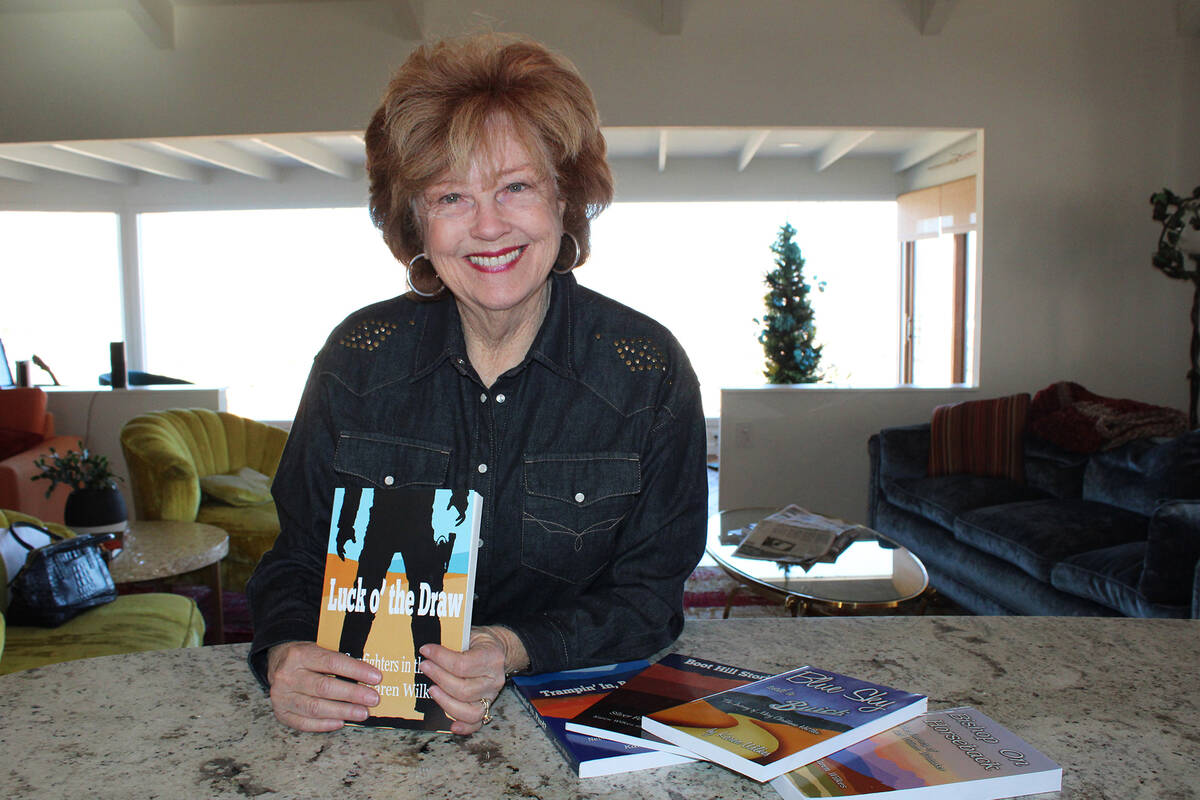
As a lifelong Nevada resident, Boulder City’s Karen Wilkes takes pride in the Silver State, which includes its colorful history.
As part of that, in recent years she’s self-published five books, all centering on the mining days of the Old West.
“I’m a graduate of UNR (University of Nevada) and was an English major and history minor,” she said. “I decided early on that teaching was not for me so I ended up going into the insurance industry. I didn’t pursue anything pertaining to my degrees for many, many years.”
Having grown up in Pioche, Nev., which is located in Lincoln County and still has a population of less than 1,000 residents, Wilkes was no stranger to rural Nevada or the history of her hometown. Pioche proved to be one of the most important mining areas in the state back in the late 1800s.
“I basically grew up in a town that’s very historic,” she said, noting that her father also grew up in Pioche. “But like any young person, at that time, I thought, ‘Who cares? Get me out of here.’”
Before she retired, she helped her dad write down some of Pioche’s history to the point that she and her husband, Darryl Martin, thought there may be a book there. They turned that into “High Desert Tales,” with memories of the 1930s in a mining town. She said helping her father triggered the writer in herself as she prepared to retire a little more than a decade ago.
“I had gotten to the point that I wanted to write more and work less,” she said. “When I did retire, I knew I really wanted to give back to my state. I care about Nevada and its history. I knew I had a perspective on mining and this historic town (Pioche). I’m focused on bringing forth information about Nevada’s history that hasn’t been written.”
As she pointed out, the advantage to self-publishing is that she gets to choose the subjects of the books and write within her own time frame. In doing so, each of her books has taken between six months to more than a year to complete. The downside is that self-publishing normally sees little money in the author’s pockets.
“It’s never, ever been about making money. I’m working for a legacy. Period. I don’t need any money, which is a good thing because I probably wouldn’t get any,” she said, laughing. “I get to do everything on my terms.”
She published “Blue Sky and a Buick,” “Bishop on Horseback,” “Trampin’ In, Pard?” and “Boot Hill Stories” before coming out with her most recent book, “Luck o’ the Draw,” which can be found on Amazon though its print-on-demand program. In it, three Irish gunslingers are featured, with Morgan Courtney being the most prominent.
Gunfighters became more prominent, and often needed, because of the number of stolen mining claims. The gunfighters were brought in as security, of sorts, since many of these areas often lacked any kind of law enforcement such as a sheriff or marshal. The result, though, is that many of these gunfights, thanks to either alcohol, machismo, or both, often died young via a gunfight. These individuals were buried in what’s called a boot hill cemetery, since they died with their boots on. Pioche has one such cemetery, as does Virginia City.
One of the most famous gunfighters from Pioche was Morgan Courtney. After reading a piece from the 1990s in Nevada Magazine on Courtney, Wilkes decided to take a deeper look into his life, beyond what was in the magazine article. Turns out he was an immigrant from Ireland. That spurred her curiosity as to how someone thousands of miles away ended up in Pioche.
“I started to think that if I did some more research, I could add to his story and find his route and turn it into Nevada Magazine,” she said. “I had no idea that it would eventually become a book.”
Being that her dad was the Lincoln County district attorney when she was growing up, Wilkes was no stranger to court records and trial transcripts. This came in handy when researching Courtney, who was tried for murder in 1873. Once she got in touch with officials at the county courthouse, they confirmed there was a transcript of the trial. But unlike today where things are nice and neat, back then all transcripts were done by hand.
“It was like a two-week trial with 200 pages of transcripts,” she said. “I was so excited. But because of the style at that time, it was barely readable. I spent hours staring at it trying to figure out what it said. But eventually, I found enough clues as to where he (Courtney) came from and how he got here. Before coming to Pioche he was in Australia, New Zealand, British Columbia, Idaho to Virginia City and then Pioche. His whole journey was so incredible, it blows my mind.”
Wilkes said whether it’s Courtney or the others profiled in her books, in a way she feels as though she knows each and every one of them through the hours of research and putting words on paper.
“With this book, it got to the point where for nearly two years I was almost living in 1870 in my head,” she said. “In some ways it was painful because, back then, most lived very painful lives.”
Ron Eland is editor of the Boulder City Review. He can be reached at reland@bouldercityreview.com or at 702-586-9523.